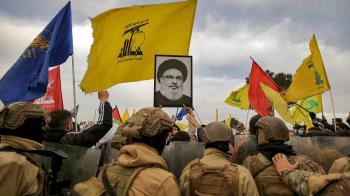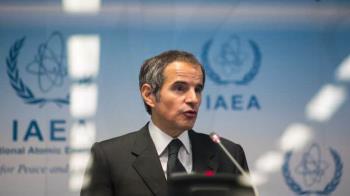Alwaght- The UNSC resolution 1701 about Lebanon has now become a focus of a political debate arising from the war between Lebanese Hezbollah and Israel.
On the one hand, the Lebanese government insists on the immutability and unconditional continuation of the implementation of this resolution, and on the other hand, the Israeli regime and its backer the US are looking to amend the terms of this resolution.
During a visit to Beirut this week, Amos Hochstein, the US President's envoy to Lebanon, said that "1701 was the only solution to the conflict between Israel and Hezbollah, but more steps should be taken to ensure that it is implemented in a 'fair, accurate and transparent manner, as it is needed."
After a meeting with Parliament Speaker Nabih Berri on Monday, Hochstein said that the decline to implement the resolution over years has contributed to rise of the dispute they are seeing now.
A Lebanese official told Al-Akhbar that "Hochstein came to create terror and he clearly said that this formula [resolution 1701] belongs to the past."
In the meantime, the media published details of Washington's favored changes to the resolution, which are said to be planned in coordination with Israel.
Al-Akhbar reported that the document that Hochstein took with him to Beirut calls for changing the language of the introduction of the UN resolution and turning it into an agreement "with the aim of establishing peace on the borders of Lebanon and Israel and preventing any armed presence in Lebanese areas close to these borders."
Citing the details of the proposal, the report adds: "It is requested that the geographical scope of the international decision-making authority be expanded to a few kilometers north of the Litani River, at least two kilometers." Also the US wanted a significant increase in the number of international peacekeeping forces and Lebanese army forces in that region.
Hochstein has also called for expanding the powers of international forces with the right to carry out "intrusive patrols" and search homes, cars or places suspected of storing weapons.
The proposed modifications by the US envoy do not end there and include the deployment of inspection teams at Lebanese airports and the setting up observation towers in the north and south of the country.
Washington's intended amendments, which are seen as a reflection of Israel's demands for greater control over Lebanese territory, were met with the explicit opposition of the Lebanese, as Najib Mikati, the caretaker prime minister, rejected any alternative to the resolution in an interview with the media. He, however, said that new understandings can be reached that will help the effective implementation of this resolution.
US aims behind resolution amendments
The US envoy visited Beirut with his proposed package to be dictated on the Lebanese officials while only a few people think that the White House has a neutral role in Lebanon.
While Hochstein claims to be seeking a truce, Politico reported in late September, citing several US and Israeli officials, that he and Brett McGurk, the US national security coordinator for West Asia and North Africa, told Israeli leaders that Washington " agreed with Netanyahu's strategy to shift Israel's military focus [from Gaza] to the north against Hezbollah."
Given this background, the US policy to change resolution 1701 should be seen in the context of the Israeli regime's ground and air invasion of Lebanon.
Hochstein set his visit to hours after the heavy bombardment of the capital Beirut by the Israeli fighter jets so that he can talk with the Lebanese from a position of power and secure a political victory ahead of an expected military defeat as the Israeli ground invasion has failed to make any gains so far as it is meets the firm barrier of Hezbollah.
Over the past year, tens of thousands of Israeli settlers have been displaced from the north of the occupied territories, and Netanyahu's cabinet, under pressure from the opposition, is looking for a way to get security guarantees for the return of the settlers.
Therefore, the revision of Resolution 1701, more than anything, will be securing an easy victory beyond the military power of the regime because Hezbollah has announced that it will not fall short of its conditions to accept the return to the other side of the Blue Line. The conditions include halting the regime's killing machine in Gaza, halting aerial attacks on Lebanon, and possibly ending the occupation of Lebanon's Shabba Farms.
The Blue Line refers to the 120 km area under the control of the UN peacekeeping mission officially known as United Nations Interim Force in Lebanon (UNIFIL), which was demarcated by the United Nations after Israel withdrew from southern Lebanon in 2000.
After the 2006 war, the Israeli regime continued to encroach on Lebanon's territory and airspace by repeatedly violating resolution 1701. The Lebanese government announced that Israel violated this resolution more than 30,000 times since 2006.
Also, Hezbollah has declared that its presence in this area is justified because Israel has not withdrawn from the Lebanese lands in the Shabaa Farms. The Israelis ignore international resolutions under the pretext that this area is part of the Golan Heights, which they took from Syria in 1967. However, the US is seeking one-sided pressure on Lebanon to accept more commitments under the esolution, regardless of the regime's aggression nd its non-compliance with UN resolutions.
Another aim of the US is strengthening the position of UNIFIL forces in Lebanon so that in the future they can fulfill the role of a proxy force with international legitimacy for the Israeli occupation army.
Last year, the US allocated $143 million to UNIFIL for 2023, about a quarter of the force's $507 million budget.
Meanwhile, Lebanese public opinion raises critical questions about the effectiveness of this force in stopping the aggression of the Israeli regime on their country's territory.
Actually, while even the UNIFIL forces are not safe from the Israeli attacks, the Lebanese believe that the only purpose of increasing the activity of these forces is to weaken Lebanon's defense position, because in the absence of a powerful army, Hezbollah is practically the main defender of Lebanon's borders against the aggression of the occupying army.
Another aim behind the resolution revision push by the US is to prevent another Israeli defeat like that of 2006. The American and Israeli strategists know well that the largely worn and exhausted Israeli army cannot defeat Hezbollah and certainly with the emergence of signs of Hezbollah's upper hand in war, the internal Israeli front will suffer a major collapse, with its consequences outweighing those of Hamas’s October 7 Operation Al-Aqsa Storm.
After its victory in the 33-day war of 2006, Hezbollah transformed from a small internal force into an undisputed regional power and took the pulse of Lebanon's developments as its home popularity grew high. Certainly, Hezbollah's situation today against Israeli attack is much better than in 2006, and scoring a new victory in the war will create a stronger movement of it and will also shatter the last efforts to rebuild the security pillars of the regime. Therefore, Washington and Tel Aviv think that before the war determines the political equations, by them imposing new conditions on Lebanon under resolution 1701, they should make the political equations determine the result of the war.



























